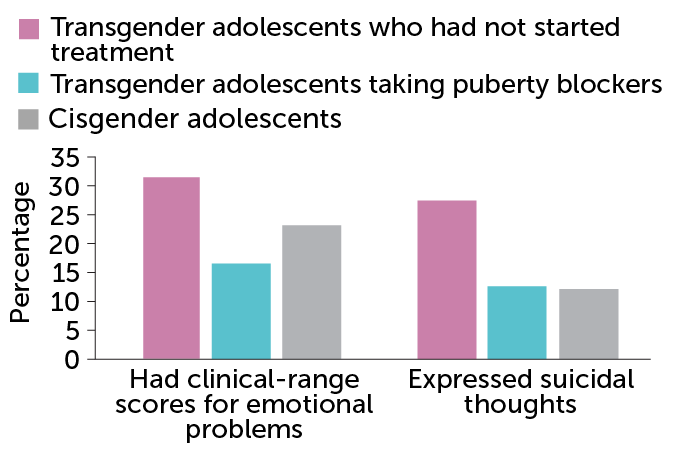The Significance Of Gender Euphoria Measurement In Transgender Mental Healthcare

Table of Contents
Understanding Gender Euphoria and its Role in Transgender Well-being
Gender euphoria is the feeling of joy, contentment, and affirmation experienced when one's gender identity is validated and expressed authentically. This differs significantly from gender dysphoria, which is the distress caused by a mismatch between one's gender identity and assigned sex. While addressing gender dysphoria is crucial, promoting and measuring gender euphoria is equally vital for holistic transgender mental health. Gender affirmation—through social transition, medical interventions like hormone therapy, and supportive social networks—plays a significant role in fostering gender euphoria.
The impact of gender euphoria on trans individuals' overall mental and emotional health is profound:
- Increased self-esteem and confidence: Affirming one's true gender identity leads to a stronger sense of self and increased self-acceptance.
- Improved social interactions and relationships: Openly expressing one's gender identity can lead to more authentic and fulfilling relationships.
- Reduced anxiety and depression: Experiencing gender euphoria is strongly correlated with a reduction in symptoms of anxiety and depression often associated with gender dysphoria.
- Enhanced sense of self and identity: Gender euphoria allows trans individuals to feel more comfortable and congruent in their own skin, leading to a stronger sense of self and improved overall wellbeing.
Measuring Gender Euphoria: Methods and Challenges
Accurately measuring gender euphoria presents both opportunities and challenges. Several methods are employed, each with its own strengths and limitations:
- Validated questionnaires: Researchers are developing specific questionnaires to quantify gender euphoria. While still under development, these offer a standardized approach to measuring this subjective experience.
- Qualitative data collection methods: Interviews and focus groups provide richer, nuanced data about individuals' experiences of gender euphoria, capturing the complexity of this phenomenon. This qualitative approach is valuable to supplement quantitative data.
- Challenges in standardization and cross-cultural validity: The subjective nature of gender euphoria makes it difficult to create universally applicable measurement tools. Cultural context significantly influences the expression and experience of gender, impacting the validity of standardized tools across diverse populations.
- Importance of considering intersectionality: It's crucial to acknowledge that factors such as race, ethnicity, socioeconomic status, and disability can interact with gender identity to influence experiences of gender euphoria. Measurement tools must be inclusive and account for these intersecting identities.
The Clinical Significance of Gender Euphoria Measurement in Treatment
Measuring gender euphoria is not simply an academic exercise; it's a clinically significant tool for improving transgender healthcare. Tracking gender euphoria provides valuable insights into the effectiveness of interventions and guides treatment plans:
- Informing treatment decisions: Measuring gender euphoria can help healthcare providers determine the appropriate timing and approach for medical interventions like hormone therapy or surgery.
- Monitoring the effectiveness of interventions: Tracking changes in gender euphoria over time allows healthcare providers to assess the success of various gender-affirming interventions.
- Assessing overall well-being and quality of life: Gender euphoria is a strong indicator of overall mental health and quality of life for transgender individuals.
- Identifying areas for improvement in care: By measuring gender euphoria, healthcare providers can identify areas where care could be improved and tailor interventions to better meet the needs of individual patients.
Integrating Gender Euphoria Measurement into Comprehensive Transgender Healthcare
Integrating the measurement of gender euphoria into routine clinical practice is essential for providing truly comprehensive transgender healthcare. This requires:
- Training for healthcare professionals: Healthcare providers need thorough training in understanding gender euphoria, its measurement, and its significance in transgender mental health.
- Development of standardized assessment tools: Further research and development of culturally sensitive and validated assessment tools are crucial for reliable and consistent measurement.
- Integration into electronic health records: Integrating gender euphoria measurement into electronic health records ensures that this critical data is consistently collected and readily accessible to healthcare providers.
- Policy changes to support gender-affirming care: Policies that support gender-affirming care, including the measurement of gender euphoria, are essential to ensuring equitable access to quality healthcare for transgender individuals.
Conclusion: The Importance of Prioritizing Gender Euphoria in Transgender Mental Healthcare
Measuring gender euphoria offers invaluable insights into the mental health and overall well-being of transgender individuals. By acknowledging and actively measuring gender euphoria, alongside addressing gender dysphoria, we move toward a more holistic and effective approach to transgender mental healthcare. Further research is crucial to developing robust and culturally sensitive measurement tools. By prioritizing the measurement of gender euphoria, healthcare providers can contribute significantly to the improved mental health and overall well-being of transgender individuals. Let's work together to integrate this crucial aspect of gender affirmation into comprehensive transgender healthcare, improving the lives of trans individuals and enhancing LGBTQ+ mental health.

Featured Posts
-
 A Cold War Relic Investigating The Greenland Ice Base Conspiracy
May 15, 2025
A Cold War Relic Investigating The Greenland Ice Base Conspiracy
May 15, 2025 -
 Menendez Case Judge Opens Door For Resentencing
May 15, 2025
Menendez Case Judge Opens Door For Resentencing
May 15, 2025 -
 Kid Cudi Auction High Prices For Jewelry And Sneakers
May 15, 2025
Kid Cudi Auction High Prices For Jewelry And Sneakers
May 15, 2025 -
 Nba Play In Warriors Grizzlies Matchup Breakdown
May 15, 2025
Nba Play In Warriors Grizzlies Matchup Breakdown
May 15, 2025 -
 Los Angeles Dodgers Add Kbos Hyeseong Kim Reports
May 15, 2025
Los Angeles Dodgers Add Kbos Hyeseong Kim Reports
May 15, 2025
